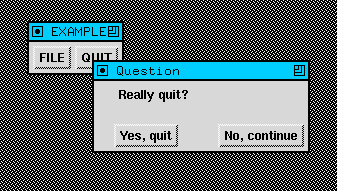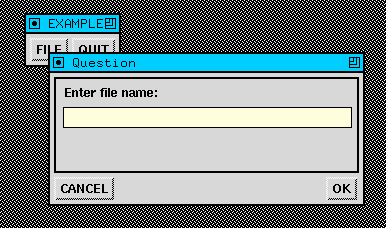 Simple general purpose pop-ups
Simple general purpose pop-ups Simple general purpose pop-ups
Simple general purpose pop-ups
 |
 |
The also exists a similar pop-up, created by
GgiPlotPrompter(),
which allows the user, besides of specifying a file name, to
choose an available PGPLOT hardcopy device.
More powerful and complex general purpose pop-ups, e.g. for selecting files
or specifying input sets, subsets and boxes, are discussed in the
next page.
Example program:
/* example9.c -XT */
#include "stddef.h"
#include "gipsyc.h"
#include "cmain.h"
#include "init.h"
#include "finis.h"
#include "userfio.h"
#include "ggi.h"
/*
* Button keyword handler for quitting.
*/
static void quit(ident id, char *key, int code, void *arg)
{
bool button=toflog(FALSE);
(void)userflog(&button, 1, 2, key, " ");
if (tobool(button)) {
wkeyf(key); /* reset button */
if (GgiVerify("Really quit?", "Yes, quit", "No, continue")) {
finis_c();
}
}
}
/*
* Button keyword handler creating the "file name" prompter.
*/
static void promptuser(ident id, char *key, int code, void *arg)
{
bool button=toflog(FALSE);
(void)userflog(&button, 1, 2, key, " ");
if (tobool(button)) {
GgiPrompter("FILENAME=", "Enter file name:"); /* create prompter */
wkeyf(key); /* reset button */
}
}
/*
* Keyword handler receiving the resulting "file name".
*/
static void getresult(ident id, char *key, int code, void *arg)
{
static bool confirmed=FALSE;
fint nread;
fchar text;
char ctext[128];
text.a = ctext; text.l = 127;
nread = userftext(text, 2, key, " ");
ctext[nread] = '\0';
if (nread) {
if (strncmp(ctext, "exist", 4 )) {
GgiPrompter("ACCEPT", NULL); /* accept "non-existing" filename */
confirmed = FALSE;
} else if (!confirmed) {
GgiPrompter("AGAIN", "OK to overwrite?"); /* ask user confirmation */
confirmed = TRUE;
} else {
GgiPrompter("ACCEPT", NULL); /* accept after confirmation */
confirmed = FALSE;
}
} else {
confirmed = FALSE; /* user pressed "CANCEL" */
}
}
MAIN_PROGRAM_ENTRY
{
ident button, quitbtn;
init_c();
GgiAutoLayout(FALSE);
GgiPostponeRealize(TRUE);
button = GgiButton("FILE=", "File name entry");
quitbtn = GgiButton("QUIT=", "Terminate program");
GgiSetPosition(button, 0, NULL, 0, NULL);
GgiSetPosition(quitbtn, 0, button, 0, NULL);
GgiRealize();
(void)ScheduleKeyevent(promptuser, "FILE=", KEYCHANGE, NULL);
(void)ScheduleKeyevent(quit, "QUIT=", KEYCHANGE, NULL);
(void)ScheduleKeyevent(getresult, "FILENAME=" , KEYCHANGE, NULL);
MainLoop();
}


|
Maintained by J. P. Terlouw |